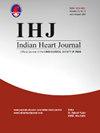Current status of cardiology fellow training based on COCATS-4 framework: A cross-sectional study from three tertiary care institutes across India
IF 1.8
Q3 CARDIAC & CARDIOVASCULAR SYSTEMS
引用次数: 0
Abstract
Background
The Core Cardiology Training Symposium (COCATS) guidelines, endorsed by the American College of Cardiology (ACC) emphasize competency-based training and establish milestones to be met during cardiology training. However, India lacks such guidelines for training cardiology fellows.
Objectives
The study aimed to evaluate the self-declared competencies of cardiology fellows across multiple preselected domains as per the COCATS-4 recommendations.
Methods
The study was conducted at three premier institutions across India between June 2022 and December 2024. A total of 52 cardiology fellows who had recently completed their 3-year core cardiology training course were included in the study. These candidates completed a questionnaire that included a checklist assessing different levels of competency in various preselected aspects of cardiovascular medicine. Candidates were also asked about their awareness of COCATS-4 standards and cardiology training in India.
Results
While all trainees reported Level 1 competency in cardiac catheterization, heart failure, and adult congenital heart disease, a significantly lower percentage of trainees achieved Level 1 competency in nuclear medicine (1.9 %), cardiac MRI (3.8 %), and cardiac CT (17.3 %). At Level 2, cardiac catheterization (73.1 %) and echocardiography (63.5 %) had the highest self-declared competencies, whereas nuclear medicine (3.8 %), cardiac MRI (0 %), and cardiac CT (0 %) had the lowest. Only 23.1 % of trainees were aware of COCATS-4, and 82.7 % believed that standardized guidelines would improve cardiology training in India.
Conclusions
The results emphasize the wide variability in self-reported competencies of cardiology trainees across India and highlight the deficiencies in certain core areas like cardiovascular imaging.
基于COCATS-4框架的心脏病学研究员培训的现状:来自印度三所三级医疗机构的横断面研究。
背景:核心心脏病学培训研讨会(COCATS)指南,由美国心脏病学会(ACC)认可,强调以能力为基础的培训,并建立在心脏病学培训期间要达到的里程碑。然而,印度缺乏这样的培训心脏病学研究员的指南。目的:该研究旨在根据COCATS-4建议评估多个预选领域的心脏病学研究员自我宣称的能力。方法:该研究于2022年6月至2024年12月在印度的三所主要机构进行。共有52名最近完成了3年核心心脏病学培训课程的心脏病学研究员被纳入研究。这些候选人完成了一份问卷,其中包括一份清单,评估心血管医学各个预先选择方面的不同水平的能力。候选人还被问及他们对COCATS-4标准和印度心脏病学培训的认识。结果:虽然所有受训者都报告了心导管插入术、心力衰竭和成人先天性心脏病的1级能力,但在核医学(1.9%)、心脏MRI(3.8%)和心脏CT(17.3%)方面达到1级能力的受训者比例明显较低。在第2级,心导管插入术(73.1%)和超声心动图(63.5%)的自我宣称能力最高,而核医学(3.8%)、心脏MRI(0%)和心脏CT(0%)的自我宣称能力最低。只有23.1%的受训者知道COCATS-4, 82.7%的受训者认为标准化指南将改善印度的心脏病学培训。结论:研究结果强调了印度心脏病学学员自我报告能力的广泛差异,并强调了心血管成像等某些核心领域的不足。
本文章由计算机程序翻译,如有差异,请以英文原文为准。
求助全文
约1分钟内获得全文
求助全文
来源期刊

Indian heart journal
CARDIAC & CARDIOVASCULAR SYSTEMS-
CiteScore
2.60
自引率
6.70%
发文量
82
审稿时长
52 days
期刊介绍:
Indian Heart Journal (IHJ) is the official peer-reviewed open access journal of Cardiological Society of India and accepts articles for publication from across the globe. The journal aims to promote high quality research and serve as a platform for dissemination of scientific information in cardiology with particular focus on South Asia. The journal aims to publish cutting edge research in the field of clinical as well as non-clinical cardiology - including cardiovascular medicine and surgery. Some of the topics covered are Heart Failure, Coronary Artery Disease, Hypertension, Interventional Cardiology, Cardiac Surgery, Valvular Heart Disease, Pulmonary Hypertension and Infective Endocarditis. IHJ open access invites original research articles, research briefs, perspective, case reports, case vignette, cardiovascular images, cardiovascular graphics, research letters, correspondence, reader forum, and interesting photographs, for publication. IHJ open access also publishes theme-based special issues and abstracts of papers presented at the annual conference of the Cardiological Society of India.
 求助内容:
求助内容: 应助结果提醒方式:
应助结果提醒方式:


